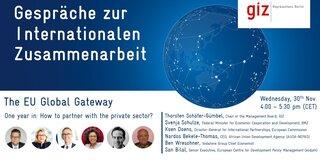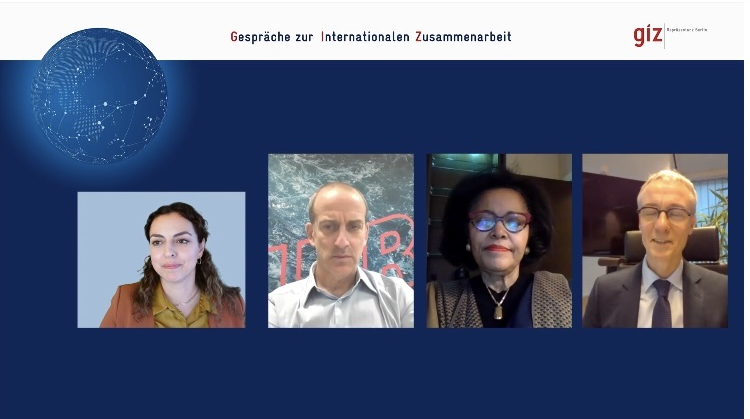Private sector cooperation under the EU Global Gateway – A high-level discussion
The GIZ Representations in Berlin and Brussels organised a high-level talk on private sector engagement in the EU Global Gateway with distinguished speakers from the EU Commission, German government, private sector, practitioners, and policy experts.

A high-level discussion
One year ago, on 1 December 2021, the European Union launched its new global connectivity strategy – the Global Gateway. The initiative strives to boost smart, clean, and secure connections in the digital, energy, and transport sectors and to strengthen health, education, and research systems across the world. Half of the investment is destined for Africa. A key innovation of the Global Gateway is its focus on cooperation with the private sector. This was the focus of the Web Talk on International Cooperation on November 30, 2022, convening high level participants from BMZ, GIZ, the European Commission, the African Union’s development agency AUDA-NEPAD and the telecommunications giant Vodafone.
Opening the event, Thorsten Schäfer-Gümbel, Chair of the GIZ Management Board, stressed that the initiative, with the aim to mobilise 300 billion euros, is an immense undertaking that will affect many stakeholders within the framework of Team Europe. Private sector partnerships are paramount to achieving its goals. Hence, the question of what policymakers must do to establish the necessary conditions for investment is central to the Global Gateway’s success.
"This is an immense undertaking that affects a great many stakeholder groups within the framework of Team Europe." Thorsten Schäfer-Gümbel, Chair of the GIZ Management Board
Federal Minister for Economic Cooperation and Development (BMZ) Svenja Schulze began her keynote emphasising the importance of infrastructure as the “hardware”. The “software” – meaning ideas, goals, and values such as democracy, human rights, climate action, social justice, and energy transition – is also key for modernisation. Both perspectives culminate in the Global Gateway and contribute to a “just transition”. The Minister finally stated that the Global Gateway can only function if it draws on a wide network of partners including the private sector’s capacities for investment and know-how.
"For me, justice means people in the Global South being able to learn in safe schools and getting treatment in modern hospitals." Svenja Schulze, Federal Minister for Economic Cooperation and Development
Integrating partner countries’ perspectives
Koen Doens, Director-General for International Partnerships at the European Commission, and Nardos Bekele-Thomas, Chief Executive Officer of the African Union Development Agency (AUDA-NEPAD), stressed that all projects need to be based on Africa’s own agenda and priorities, ensuring that they will be tailored to the economic situation and also socially, environmentally and economically sustainable. According to Nardos Bekele-Thomas, the Global Gateway should better incorporate the African private sector. For Ben Wreschner, Chief Economist at the Vodafone Group, the Global Gateway is about learning from the African continent, which in many cases is a digital native and very savvy on digital technologies. Finally, San Bilal, Senior Executive at the European Centre for Development Policy Management argued that the Global Gateway’s European geostrategic motives are creating more equality with partner countries than a purely developmental approach.
"It is no more talking about for Africa, doing this for them, it is no more that – the whole partnership is with Africa." Nardos Bekele-Thomas, AUDA-NEPAD CEO
Bringing in the private sector
Ben Wreschner emphasised that a long-term profit maximising strategy has to go hand in hand with a long-term maximising societal contribution strategy to achieve both the best outcome for the wider society along with the best environment for corporations. To include the private sector into the Global Gateway, Koen Doens highlighted that a Business Advisory Group has been created. It will operate alongside the exiting consultation structures, such as the European chambers of commers or the joint business fora. This will allow the private sector to bring in its knowledge according to the priorities identified by the public sector.
"There is a real reason to invest in some of these solutions, not just because they have a benefit in Africa but because they have a benefit to the whole world." Ben Wreschner, Vodafone Group Chief Economist
Koen Doens highlighted the “significant paradigm” shift marked by the Global Gateway, which becomes apparent in the EU’s official development assistance now increasingly going to infrastructure, private sector development, and the provisions of guarantees which allow to de-risk private-public investment. However, according to San Bilal, an inclusive approach is needed to ensure the participation of the smaller EU member states and smaller enterprises.
The event concluded with a positive take by Koen Doens, underlining that he had never seen as much positive excitement for an initiative of the EU as for the Global Gateway and that this is something to look forward to in 2023.
